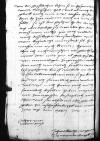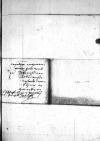List #5858
Johann Albrecht of Brandenburg-Ansbach do Ioannes DANTISCUSAschaffenburg, 1532-01-01
| odebrano Brussels, 1532-01-12 Rękopiśmienne podstawy źródłowe:
Pomocnicze podstawy źródłowe:
| ||||||
Tekst + aparat krytyczny + komentarz Zwykły tekst Tekst + komentarz Tekst + aparat krytyczny
Er paper damaged⌈[Er]Er paper damaged⌉wyrdige(n) meynem gutt(en) hern und freundt paper damaged⌈[freundt]freundt paper damaged⌉
Erwyrdiger wesunder gutter her und freundt.
Las euch wyssen, das ich an dem neuen iars tag pey m(einem) g(nedigen)
Gyb euch auch zuerkennen, wyebol ich glaub, ir selchs lengst gebist hadt, das meinem bruder
Ferner wyl ich euch gepet(en) haben, mir zuversten geben, ab  AAWO, AB, D.90, f. 85v von den geystlichen lehen so in
AAWO, AB, D.90, f. 85v von den geystlichen lehen so in
So ist das geschra hy, das der
Hymit thue ich euch wunschen ein gluckselig neues iare. / Mit pit als gut gesellen von meinetbegen zu grussen, welch dan nach mir werd(en) fragen, unnd dyse peyligente brieff welledt an dy [...] hidden by binding⌈[...][...] hidden by binding⌉ lassen uberantborten, woe si hin keren. Das wyl ich freuntlich gern verdinen und wyl mich himit euch auch freuntlich befollen haben, meyner nit zuvergessen. Das wyl ich auch thun und stee alsodt in alt(en) glauben.
Geben zu
Alzeyt inn euerem dinst
Postscript:
Negotium



